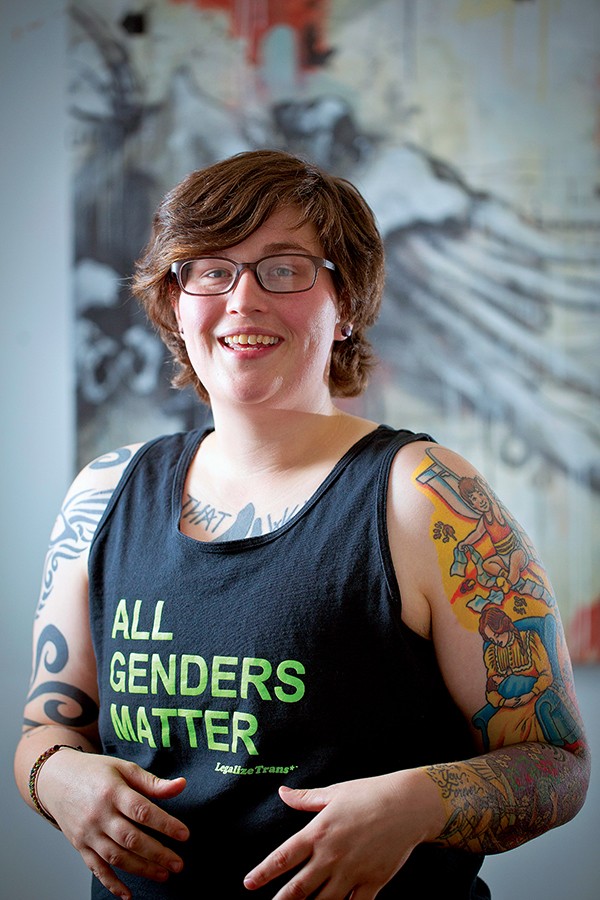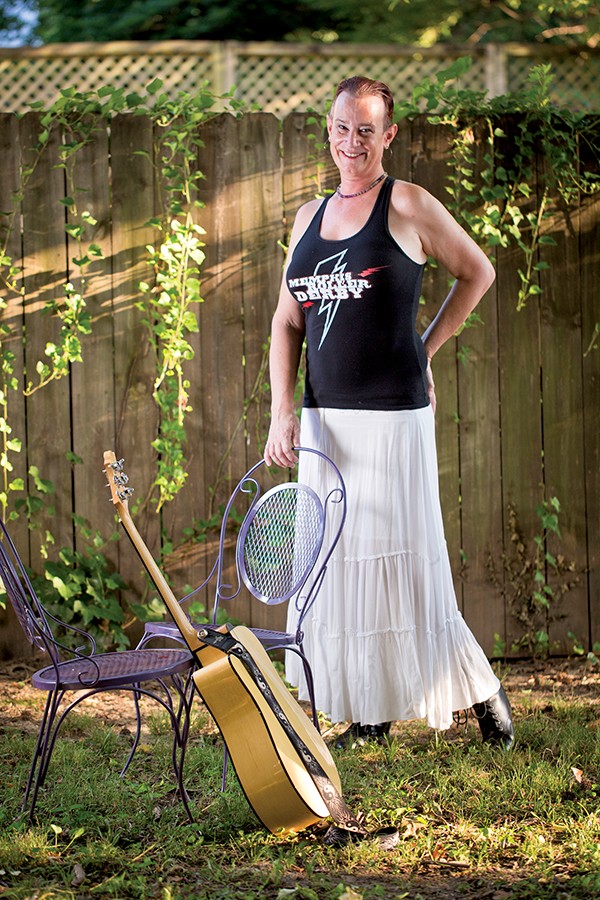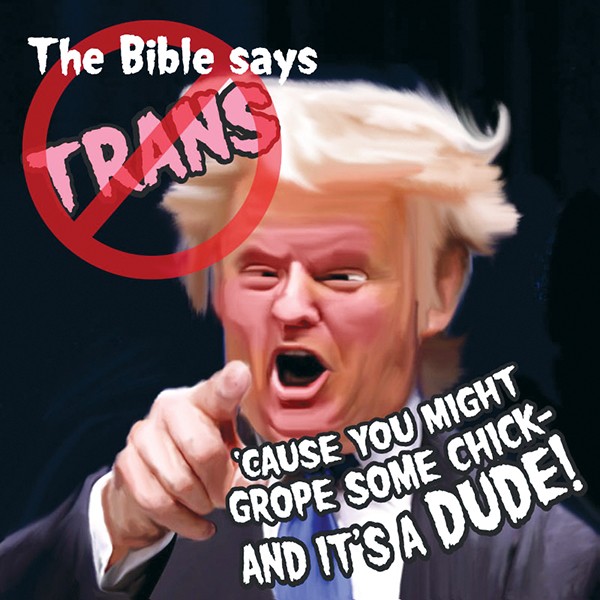Ellyahnna Hall is stunning. She’s tall and thin, has soft facial features, sweeping eyelashes, and waist-length braids in kaleidoscopic colors — pink, purple, blue.
She’s also smart. She studied journalism at the University of Memphis and went to school for pharmacy tech. But when Hall went looking for a pharmacy job several years ago, no one would hire her.
Hall is a transgender woman. She was assigned male at birth, but she’s publicly identified as female since 1999, when she was a 17-year-old junior at Millington Central High School.

Ellyahnna Hall
“In one interview, I went in, and I was told that I know my stuff and would make a great employee but that I couldn’t be hired because the other employees might not feel comfortable working with a transgender person,” Hall says.
“It got to a point where I decided that I’d rather take my chances living on the street than be in an office somewhere dressed like a male,” Hall says.
And like many trans people, Hall did struggle with homelessness on and off for years. But now she’s found work where she’s able to be herself — behind the wheel of a big rig. And she’s preparing for her gender confirmation surgery (formerly known as sex reassignment surgery).
“When I tell people out there that I’m trans, it’s so different than it was 14 years ago. You would think at a truck stop it would be weird, but you find the most accepting people at truck stops,” Hall says.
While that may have something to do the independent nature of truckers, it’s likely also a sign that the tide is turning for transgender acceptance and equality.
In April, Olympic decathlete and Keeping Up with the Kardashians star Caitlyn Jenner came out as a transgender woman in an interview with Diane Sawyer. ESPN awarded Jenner the Arthur Ashe Courage Award in July for having “shown the courage to embrace a truth that had been hidden for years.”
Actress Laverne Cox has brought attention to trans issues through her role as Sophia Burset on Orange Is the New Black. And Cher’s son, Chaz Bono, came out as a trans man back in 2009.
All of the recent media coverage of trans celebrities coupled with the fact that the LGBT community and its allies finally won the battle for marriage equality in June have paved the way for more attention to be turned to some of the more pressing human rights needs in the LGBT fight for equality. And transgender issues top that list.
But the needs of the transgender community are many, and much misunderstanding and prejudice still exist. In Tennessee and in most of the country, the trans community lacks basic civil rights.
Job Discrimination
With her chin-length brown hair and youthful glow, Victoria Hester looks like a confident young woman in her prime. But it wasn’t long ago that Hester was struggling with her identity, hiding behind the relative safety of presenting herself as a gay man.
“I came out in February [of this year]. That’s when I first went out in public as a woman and came out to everyone on Facebook,” Hester says. “I went through a dark depression and a suicide attempt before I came out. I was so miserable from hiding myself. I said, ‘This is enough. I’ve got to start living my life.'”
 Justin Fox Burks
Justin Fox Burks
Victoria Hester
Hester has always known though. When she was little, she’d try on her mom’s clothes, makeup, and high heels, but she was punished for it. Though she says her coming out has been largely positive, she still struggles with one of the biggest issues facing the trans community — being out in the workplace.
Hester applied to a number of jobs after coming out, but even companies with trans-inclusive nondiscrimination policies turned her down. There were bills to pay, so to survive, she was forced to interview for a job as a man. She was hired, and she goes to work presenting as male. Her employer doesn’t know she’s transgender.
“It’s miserable. I hate looking in the mirror. I don’t like being called ‘sir,’ and I don’t like being called by my male name. But I have to tell myself that I’m going in for eight hours, and I’m going to do an acting role. As soon as I get home, I’m putting on my clothes, which are women’s clothes. That’s what I do to get through,” Hester says.
“Injustice at Every Turn,” a report on trans discrimination by the National Center for Transgender Equality (NCTE), found that trans people have double the rate of unemployment compared with the general population, and 90 percent of those surveyed reported experiencing harassment, mistreatment, or discrimination on the job. More than 70 percent said they tried to avoid discrimination by hiding their gender identity at work.
The Employment Non-Discrimination Act, federal legislation that would prohibit discrimination in hiring and employment on the basis of sexual orientation and gender identity, has been introduced in every Congress since 1994. It has the support of President Barack Obama, but it’s been met with much resistance from the Republican-controlled legislature.
The city of Memphis does have a trans-inclusive nondiscrimination ordinance, but its protections only extend to city employees. Shelby County’s nondiscrimination ordinance contains murky language that protects employees on “non-merit factors,” but attempts to add “sexual orientation” and “gender identity and expression” last year failed. And a state law passed in 2011 prevents local governments from passing ordinances that offer protections outside of government jobs.
Some local companies, such as FedEx, have taken it upon themselves to add gender identity to their nondiscrimination policies. But even when corporate policy dictates acceptance, it can still be tough for trans employees to feel comfortable with how fellow employees may react.
Alex Roberts, a local transgender man, works for FedEx, and he’s still working up the courage to come out at work.
“I’m more concerned with how my fellow employees will handle it,” he says.
For those who do come out on the job, they often must be prepared to give their coworkers a bit of an education.
Kye, a transgender man who asked that the Flyer withhold his last name, works in a job with a trans-inclusive nondiscrimination policy. He lived much of his life presenting as a lesbian, but he came out four years ago after 11 years on the job.
“Everybody who worked with me had to transition with me. They had to get used to saying ‘he’ instead of ‘she.’ And sometimes, they still slip up, but I know, for the most part, everybody is trying,” Kye says. “I think they adjusted easily because they knew me before. They understood this is what I needed to do. But if I had been a [newbie], it might have been a whole different issue.”
Homelessness
With unemployment such a huge issue, it follows that the trans community is disproportionately affected by homelessness. One-fifth of respondents to the NCTE survey reported experiencing homelessness at some point because of their gender identity.
Alexia Taylor, a transgender woman, knows firsthand about homelessness and job discrimination. Not only has she been turned down for numerous jobs, including getting hired at and fired from Taco Bell in a span of two days, she’s spent many nights on the Memphis streets. And she says the homeless shelters in Memphis are not trans-friendly.
“I went to the Union Mission, and they told me that transgender people were not welcome,” Taylor says.
She wasn’t willing to present as male to stay in a shelter, so she had to live on the streets. On October 15th of last year, Taylor was stabbed 13 times in an alley behind Catholic Charities of West Tennessee in Midtown. She believes the attack was a hate crime, but Tennessee’s hate crimes law only offers protection on the basis of sexual orientation, not gender identity.
Taylor finally found an apartment through Friends for Life, a trans-friendly HIV/AIDS nonprofit that also helps to house the city’s homeless. Life on the streets for a trans woman of color can be especially brutal, Taylor says. She says she’s faced harassment by Memphis police officers, who assume, because she’s trans and on the street, that she must be prostituting.
“I have had a charge for prostitution, but that was over 10 years ago, so why do they have to assume I’m doing it now? The police are bad about that,” Taylor says. “And so often, trans women are introduced into prostitution because that, and doing drag shows, are two ways of getting income, because it’s hard to get a job.”
In 2008, Memphis made national headlines when Memphis police officer Bridges McRae brutally beat a trans woman, Duanna Johnson, on video in the holding area at 201 Poplar. Johnson had been picked up on a prostitution charge, which she alleged was unjust. McRae was later sentenced to two years in federal prison for the incident. Months later, Johnson was found fatally shot in a North Memphis street, and the case remains unsolved. She had also struggled with homelessness.
Tamara Hendrix, organizing coordinator for Homeless Organizing for Power and Equality (H.O.P.E.), said she’s heard none of the city’s temporary shelters are trans-friendly. And because they’re religion-based and don’t receive federal funding, they aren’t under any legal obligation to welcome trans people.
H.O.P.E. is currently working with the Memphis Gay & Lesbian Community Center (MGLCC) on a survey of local homeless service providers to determine attitudes and policies toward the LGBT population.
“We have an evaluation form with questions like, ‘How do you think an LGBT person walking into your organization would feel about the organization? What [sensitivity] training has your staff had?’ Stephanie Reyes, the programs/youth services coordinator at MGLCC, says.
MGLCC will use their findings to better refer clients who come in needing housing services. While some of those clients are adults whose struggle to find work has led to homelessness, others are trans kids whose parents have kicked them out after coming out.
“[The MGLCC has] a youth emergency services center where we help them with immediate needs, like food, clothes, and hygiene kits,” Reyes said. But there aren’t many options for housing LGBT youth in Memphis either. That’s one issue at the top of the Tennessee Equality Project’s (TEP) 2015-2019 political agenda.
“We’re pushing to get cities and counties to commit budget dollars to [LGBT youth transitional housing],” TEP Executive Director Chris Sanders says. “If a city wants to rent rooms in a hotel and allow the young person to stay for six months while he or she gets on their feet, that would work. Or if they wanted to provide vouchers to a shelter that could guarantee the person would not be discriminated against, that would be fine too. We’re not particular about the means, but we do think, morally, a city and county ought to commit funds to making sure this population is protected.”
Health care
Transgender patients come with a special set of health-care needs, especially when it comes to reproductive health. While not all trans people opt for gender confirmation surgery, many elect to take hormones to complete their transition.
Yet, according to that NCTE survey, 19 percent of respondents had been flat-out refused medical care, and 50 percent had to teach their doctors about transgender care.
“A lot of doctors want a letter from a therapist before you can even get on hormones,” Hester, who plans to start hormone treatment this month, says.
But the tide is turning. TEP will soon begin pushing for city and county governments to adopt employee insurance programs that cover transgender health needs. And they’re working to get grant money for LGBT health-care training at county-run health facilities in Memphis.
The Affordable Care Act protects against discrimination based on gender identity, and the Department of Health and Human Services recently released guidelines stating that insurers cannot limit sex-specific preventative services, such as Pap smears and prostate exams, based on gender identity.
CHOICES: Memphis Center for Reproductive Health specializes in trans health care.
“Our clinician, Nikole Gettings, began to see that the transgender population was having a really hard time finding a health-care home. There are all kinds of issues around sensitivity — what questions you ask on your intake form, what name and pronouns to use,” Katy McLeod Leopard, director of community partnerships at CHOICES, says.
So, CHOICES puts their staff through regular transgender sensitivity training. They changed their intake forms to include not just male and female gender options but also male-to-female, female-to-male, and non-binary options.
 Justin Fox Burks
Justin Fox Burks
Cole Bradley
Cole Bradley identifies as non-binary, which means that Bradley falls on a spectrum between male and female. Bradley was assigned female at birth but, over time, realized that their (Bradley’s preferred pronoun) gender identity was more fluid.
“If you took a spectrum of Barbie to Ken, and Barbie is one and Ken is 10, I’m somewhere around a 7 or 8 most of the time, but sometimes, I’m a 6 or a 5 1/2,” Bradley says. “I go to CHOICES specifically because I don’t have to check male or female on the paperwork. That’s the only doctor I go to.”
“We made up all these tiny buttons that say ‘he,’ ‘she,’ ‘the,’ ‘they’ — all the pronouns that people choose to use,” Leopard says. “We have them at the check-in window, so if someone wants, they can grab a button and put it on. It keeps our staff top of mind on what pronouns to use.”
CHOICES offers hormone management, and unlike many facilities, they don’t require a letter from a therapist. Leopard estimates that they see about 50 transgender patients.
The Gender Marker Issue
Tennessee is the only state with a law on the books prohibiting transgender people from changing the gender marker on their birth certificates. One may change the gender marker on their driver’s license but only after having gender confirmation surgery. But many trans people opt not to have the surgery.
“It makes it harder to change other documents. Gender is usually the first question the Department of Safety asks people who are trying to update their driver’s licenses,” Marisa Richmond, executive director of the Tennessee Transgender Political Coalition (TTPC), says.
Not being able to change one’s driver’s license can cause issues at the polls, thanks to the state’s voter ID requirement. It can also influence one’s ability to open a bank account or to establish identity when applying to colleges.
This presents a problem for Kye, whose job, which he asked that the Flyer not reveal, involves driving. He managed to get his passport gender marker changed since the federal government does allow for such changes. But he fears being outed because his driver’s license says he’s female.
“To me, it’s a safety issue, and it’s an outing issue,” Kye says. “I applied for a second job that I ended up getting, but in the back of my mind, I was worried that they’d see the female marker and I wouldn’t get the job. And safety-wise, who’s to say there’s not some nut out there who could see my ID and hurt me? Some people have a lot of hate in their hearts, and transgender people get killed all the time.”
Richmond says bills to change the law have been introduced but not passed. And with the current political environment in the state, she doesn’t see that changing soon. So, TTPC is working with the American Civil Liberties Union to prepare a class action lawsuit against the state.
For now, the MGLCC is working to assist the local trans community with getting passports to use as ID. The center is also compiling a list of trans-friendly services, providers, and businesses that will include everything from companies with trans-friendly hiring practices to trans-competent medical facilities to places to eat and shop without facing harassment.
“It’s tough for transgender people to find employment and even to go out to dinner and feel safe,” Will Batts, executive director of the MGLCC, says.
Bathroom Bills and Bullying
There are other issues facing the trans community in Memphis and Tennessee — some as basic as facing discrimination when using the bathroom. Since coming out as a trans man, Roberts says his biggest concern is using the men’s restroom.
“I constantly worry that I will get called out for supposedly not using the correct bathroom. I wish people would not worry about what bathroom I use and just let me do my business and leave,” Roberts says. “Transgender people do not dress up as the opposite sex just to go into the bathroom of the opposite gender for perverted reasons.”
Bizarre as it may sound, that was the sentiment behind a 2012 bill sponsored by Tennessee Senator Bo Watson and Representative Richard Floyd that would have fined trans people $50 for using bathrooms and dressing rooms that matched their gender identity.
Watson withdrew the bill after Floyd defended it by saying that if he caught a trans man in a dressing room, he’d “try to stomp a mudhole in him and then stomp him dry.”
Trans students do have some protection on the bathroom issue, however. In late June, the Department of Justice affirmed that Title IX protects the right of transgender students to use the restroom that matches their gender identity.
Bullying in schools remains an issue for many. Across the state, many school systems lack trans-inclusive anti-bullying policies, but Shelby County Schools does have a policy that offers protection on the basis of sexual orientation and gender identity and expression.
On the Bright Side
Local singer-songwriter/comedian/Memphis Roller Derby jam-timer Lisa Michaels is an out and proud transgender woman. She came out in 2003 in California, where she lived at the time, but moved to Memphis two years ago. She’s not shy about letting people know she’s had gender confirmation surgery.
For the most part, Michaels sees Memphis as a friendly place.
 Justin Fox Burks
Justin Fox Burks
Lisa Michaels
“I’ve hardly had any bad experiences in Memphis as a trans person, and I’m very out,” Michaels says. “I’m not afraid to be out. I’m a little wary when I’m walking down the street at night after performing in a club. But for the most part, I don’t live in fear. And people have been nothing but kind to me.”
Michaels reasons that her openness makes people feel more comfortable and, thus, more likely to accept her. She also says it may have something to do with the company she keeps — artists, musicians, and other eccentric Midtown types.
“Because I’m a musician and a comic, it gives people a reason to come talk to me. That starts a dialogue,” Michaels says.
Despite not having basic protections against hate crimes and employment discrimination, things may be looking up for the transgender community.
In late July, the Equality Act was introduced in Congress. It’s a comprehensive federal civil rights bill that would protect LGBT people from discrimination in credit, education, employment, federal funding, housing, jury service, and public accommodations.
The Pentagon announced in mid-July that it will begin a six-month study on the implications of lifting its ban on transgender men and women serving openly in the armed forces.
“Things are changing rapidly,” Michaels says. “Caitlyn [Jenner] came out and had that wonderful speech at the ESPYs, and now they’re thinking about letting transgender people into the military. Things are happening fast.”
Trans 101
Glossary
Gender identity — one’s internal, deeply held sense of gender.
Gender expression — external manifestations of gender, such as names, pronouns, clothing, hair style, behavior, voice, or body characteristics.
Transgender/Trans — umbrella term for anyone whose gender identity and/or expression differs from what is typically associated with the sex assigned at birth. A trans man is assigned female at birth but identifies as male; vice versa for a trans woman.
Cross-dresser — typically used to refer to a heterosexual man who occasionally wears women’s clothing and accessories. Cross-dressers are not transgender.
Drag queen or king — a performer who cross-dresses for entertainment. While some transgender people may choose to work as drag performers, a drag performer is not necessarily transgender. Says Victoria Hester, “Drag queens are entertainers. We are living our gender identity. We are people born in the wrong body. This is not a choice.”
Cisgender — a term to describe anyone who is not transgender. “Cis” is a Latin prefix meaning “on the same side as.”
Non-binary/genderqueer/gender-non-conforming — terms used to describe those whose gender expression is different from conventional expectations of masculinity and femininity.
Do’s
• When in doubt, ask a transgender or gender non-conforming person what pronoun they prefer to be called.
• Always use a transgender person’s chosen name rather than the name they were assigned at birth.
Don’ts
• Don’t ask a trans person about surgery. Says Cole Bradley, “If I’m not sleeping with you, it’s not any of your business. What’s in someone’s pants is not your business unless you’re getting into those pants.”
• Don’t ask about sexuality. Trans people may identify as gay, straight, or bisexual, but it’s generally considered rude to ask.
• Don’t ask trans people what their former name was. Says Bradley, “People are curious, but that doesn’t trump someone else’s right to comfort. Asking about dead names can trigger negative feelings.”
• Don’t use derogatory terms, such as tranny, she-male, shem, it, or he-she.
More …
Perpetual Transition — support group for the trans community. MGLCC, Mondays, 7 p.m.
OUTloud Comedy Night — comedy night hosted by Lisa Michaels. MGLCC, Friday, August 14th, 9:15 p.m.
 Greg Cravens
Greg Cravens 
 Justin Fox Burks
Justin Fox Burks  Justin Fox Burks
Justin Fox Burks  Justin Fox Burks
Justin Fox Burks